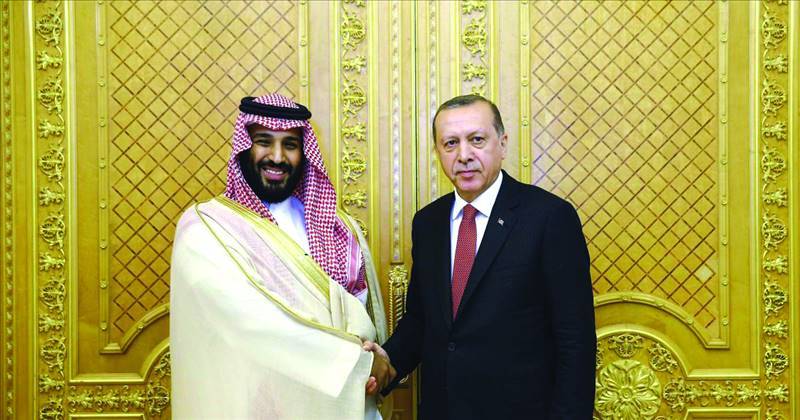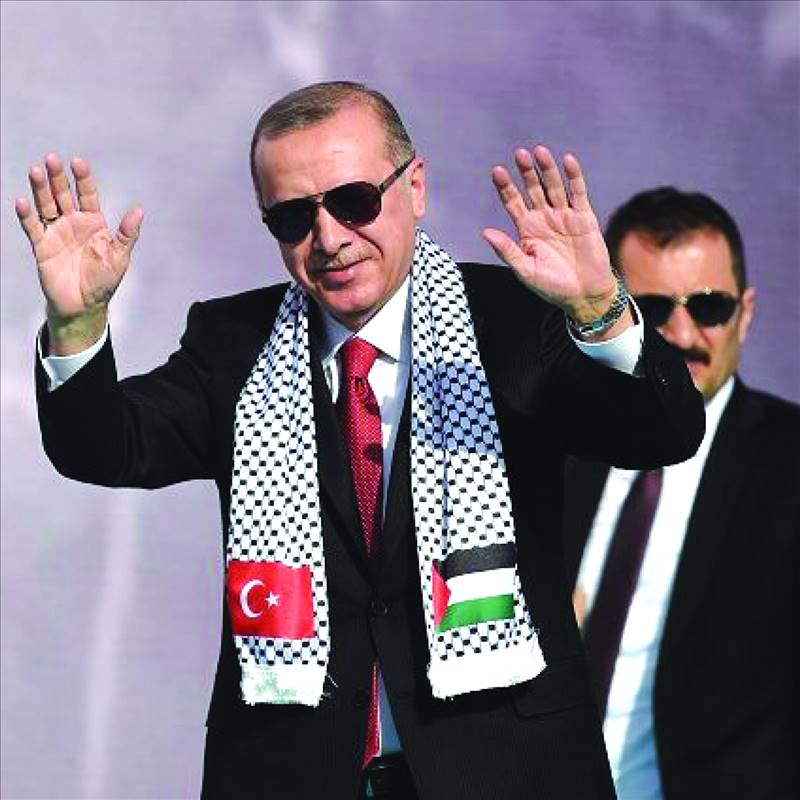
While considering strategic tensions in the contemporary Islamic world, much of our attention is concentrated on the rift between Tehran and Riyadh. However, there is a less obvious rivalry brewing between Riyadh and Ankara. Both the players are vying for strategic power and influence in the region through proxies in other states.
Turkey’s resolve for “Islamic democracy” is perceived by Saudi Arabia as a part of the former’s alleged neo-Ottoman ambitions. Also, Ankara’s support for the Muslim Brotherhood during the Arab Spring has remained a bone of contention, as Riyadh views it as an extremist group. The Erdogan government has remained sympathetic of the voice of the Arab masses during the unrest. The Turkish stance enraged the Arab kingdoms including Saudi Arabia which viewed the movement as a threat to their monarchical government at home. The rivalry thus has its basis in an ideological clash.
In the past, Turkey was chiefly concerned with being considered as a European state. Strengthening ties with Middle East was not listed higher up in its foreign policy goals. The shift in Turkey’s policy to increase its influence in the Middle East came when Prime Minister Erdogan assumed power.
The Saudi-Turkish tussle will create difficulties for the two states to attain their regional aspirations. Ankara now aims to improve its economic ties with the rest of the Middle East and play the role of a leader of the Muslim nations. Its attempts are expected to be hindered by Riyadh. Likewise, Riyadh’s resolve to reunify the Persian Gulf monarchies and attain their leadership will be dampened by Ankara’s backing for countries that challenge Riyadh. Such friction will deteriorate the negotiating power of the two states in regards to other power contenders in the region.

The soft power domain provides ample ground to the players for their pursuit of influence. Riyadh, for that matter, has been disbursing funds through non-governmental organizations. These NGOs are working in the areas of education, welfare, crisis management, masjid construction and religious instruction among the rest. On the flip side, Ankara has been utilizing the avenues of film and television to increase its soft power. The projected impact of Turkish soaps became rather evident in the recent years when Saudi Arabia decided to ban them. In March of 2018, Saudi Arabia blocked the transmission of a Turkish television series, in an implicit acknowledgement of the drama’s capacity to synthesize a glorious perception of Turkey. Turkey returned the favour within a period of a week by blocking numerous Saudi news channels. Riyadh later declared its plan to block major virtual news channels along with major websites that were funded by the Turkish government. The action was taken following the indictment of 20 nationals of Saudi Arabia by the Turkish court. The Saudis were accused of murdering dissident journalist Jamal Khashoggi within the premises of Saudi consular office in the Turkish capital. The assassination further aggravated the tension amid the two countries. Riyadh has been actively campaigning over social media against goods made in Turkey and asking Saudi nationals to avoid travelling to Turkey. Also recently, a Saudi strategic analyst publically alleged Turkey of being the disseminator of the COVID-19 pandemic in the Arab world.
The Turkish-Saudi clash has implications for the dynamics of both the countries with entities beyond their region. The rivalry has impacted the relations of the two states with the major powers of US and Russia. With improved relations between Saudi Arabia and United States, Turkey is inching closer to the Russia. Besides, Riyadh’s massive acquisition of military equipment from Washington as well as overall interest in ties with United States highlights an orientation towards Ankara as a better option for Moscow. As for Saudi Arabia, Turkey’s apparent association with Russia makes it cautious of the later. Riyadh would not want to vex the US either.
Saudi Arabia has gradually skewed in favour of US and Israel. It is one of the reasons why an increase in admiration for Turkey in Palestine is distressing not only for Israeli policy-makers but for Saudi Arabia as well. Tension is building up in Jerusalem with Saudi Arabia and Israel at one end and Turkey at the other. For Riyadh, it is an issue of maintaining its tacit status as the leader of the Muslim world. Secondly, its narrative is grounded on inhibiting differing perspectives and approaches.
Ankara, however, is not swayed from pursuing its increasingly transnational interests.
The author is a Visiting Lecturer on Pakistan Studies at the Faculty of Management Sciences, International Islamic University, Islamabad
Turkey’s resolve for “Islamic democracy” is perceived by Saudi Arabia as a part of the former’s alleged neo-Ottoman ambitions. Also, Ankara’s support for the Muslim Brotherhood during the Arab Spring has remained a bone of contention, as Riyadh views it as an extremist group. The Erdogan government has remained sympathetic of the voice of the Arab masses during the unrest. The Turkish stance enraged the Arab kingdoms including Saudi Arabia which viewed the movement as a threat to their monarchical government at home. The rivalry thus has its basis in an ideological clash.
In the past, Turkey was chiefly concerned with being considered as a European state. Strengthening ties with Middle East was not listed higher up in its foreign policy goals. The shift in Turkey’s policy to increase its influence in the Middle East came when Prime Minister Erdogan assumed power.
The Saudi-Turkish tussle will create difficulties for the two states to attain their regional aspirations. Ankara now aims to improve its economic ties with the rest of the Middle East and play the role of a leader of the Muslim nations. Its attempts are expected to be hindered by Riyadh. Likewise, Riyadh’s resolve to reunify the Persian Gulf monarchies and attain their leadership will be dampened by Ankara’s backing for countries that challenge Riyadh. Such friction will deteriorate the negotiating power of the two states in regards to other power contenders in the region.

The soft power domain provides ample ground to the players for their pursuit of influence. Riyadh, for that matter, has been disbursing funds through non-governmental organizations. These NGOs are working in the areas of education, welfare, crisis management, masjid construction and religious instruction among the rest. On the flip side, Ankara has been utilizing the avenues of film and television to increase its soft power. The projected impact of Turkish soaps became rather evident in the recent years when Saudi Arabia decided to ban them. In March of 2018, Saudi Arabia blocked the transmission of a Turkish television series, in an implicit acknowledgement of the drama’s capacity to synthesize a glorious perception of Turkey. Turkey returned the favour within a period of a week by blocking numerous Saudi news channels. Riyadh later declared its plan to block major virtual news channels along with major websites that were funded by the Turkish government. The action was taken following the indictment of 20 nationals of Saudi Arabia by the Turkish court. The Saudis were accused of murdering dissident journalist Jamal Khashoggi within the premises of Saudi consular office in the Turkish capital. The assassination further aggravated the tension amid the two countries. Riyadh has been actively campaigning over social media against goods made in Turkey and asking Saudi nationals to avoid travelling to Turkey. Also recently, a Saudi strategic analyst publically alleged Turkey of being the disseminator of the COVID-19 pandemic in the Arab world.
The Turkish-Saudi clash has implications for the dynamics of both the countries with entities beyond their region. The rivalry has impacted the relations of the two states with the major powers of US and Russia. With improved relations between Saudi Arabia and United States, Turkey is inching closer to the Russia. Besides, Riyadh’s massive acquisition of military equipment from Washington as well as overall interest in ties with United States highlights an orientation towards Ankara as a better option for Moscow. As for Saudi Arabia, Turkey’s apparent association with Russia makes it cautious of the later. Riyadh would not want to vex the US either.
Saudi Arabia has gradually skewed in favour of US and Israel. It is one of the reasons why an increase in admiration for Turkey in Palestine is distressing not only for Israeli policy-makers but for Saudi Arabia as well. Tension is building up in Jerusalem with Saudi Arabia and Israel at one end and Turkey at the other. For Riyadh, it is an issue of maintaining its tacit status as the leader of the Muslim world. Secondly, its narrative is grounded on inhibiting differing perspectives and approaches.
Ankara, however, is not swayed from pursuing its increasingly transnational interests.
The author is a Visiting Lecturer on Pakistan Studies at the Faculty of Management Sciences, International Islamic University, Islamabad

